Cryptocurrency ownership comes with unique responsibilities, especially when planning for the future. Unlike traditional assets managed by banks or brokerages, digital currencies like Bitcoin and Ethereum exist on decentralized networks with no central authority to help recover lost access. Without proper cryptocurrency inheritance and estate planning, your digital wealth could be permanently lost when you’re gone, leaving your loved ones unable to access what you intended to pass down.
This comprehensive guide will walk you through the essential steps to ensure your digital assets remain accessible to your heirs, while maintaining the security and privacy that drew you to cryptocurrency in the first place.
Without proper planning, digital assets worth millions can become permanently inaccessible
Why Cryptocurrency Inheritance Planning Is Urgent
The decentralized nature of cryptocurrency creates a unique challenge for estate planning. Unlike traditional bank accounts that can be accessed with proper documentation after death, crypto assets are secured by private keys that, if lost, make the assets permanently unrecoverable.
Alarming Fact: Approximately 1.57 million Bitcoin (worth billions of dollars) are estimated to be permanently lost, with a significant portion due to deceased owners who never shared their access information.
The consequences of failing to plan are severe:
- Permanent loss of all digital assets
- No institutional recourse (no help desk to call)
- Legal complications for heirs
- Potential tax implications even for inaccessible assets
- Family conflict during an already difficult time
“Not my key, not my coin” isn’t just about security during your lifetime—it’s about ensuring your digital legacy remains accessible to those you care about after you’re gone.
Case Study: The Bitcoin Fortune Lost Forever

In 2018, Matthew Mellon, a banking heir and cryptocurrency investor, passed away unexpectedly with approximately $500 million in XRP. He had stored his private keys in cold storage across multiple locations in the U.S., under other people’s names, without leaving clear instructions. Despite extensive efforts by his family and legal team, most of his cryptocurrency fortune remains inaccessible to this day.
This cautionary tale highlights why even large cryptocurrency holders need structured inheritance plans that balance security with accessibility for heirs.
Don’t Let Your Crypto Die With You
Download our free Crypto Estate Preparedness Checklist to ensure your digital assets remain accessible to your loved ones.
Step 1: Create a Comprehensive Digital Asset Inventory
The foundation of any cryptocurrency inheritance plan is a complete inventory of your digital holdings. This inventory should be thorough but secure, avoiding storing private keys in the same document.
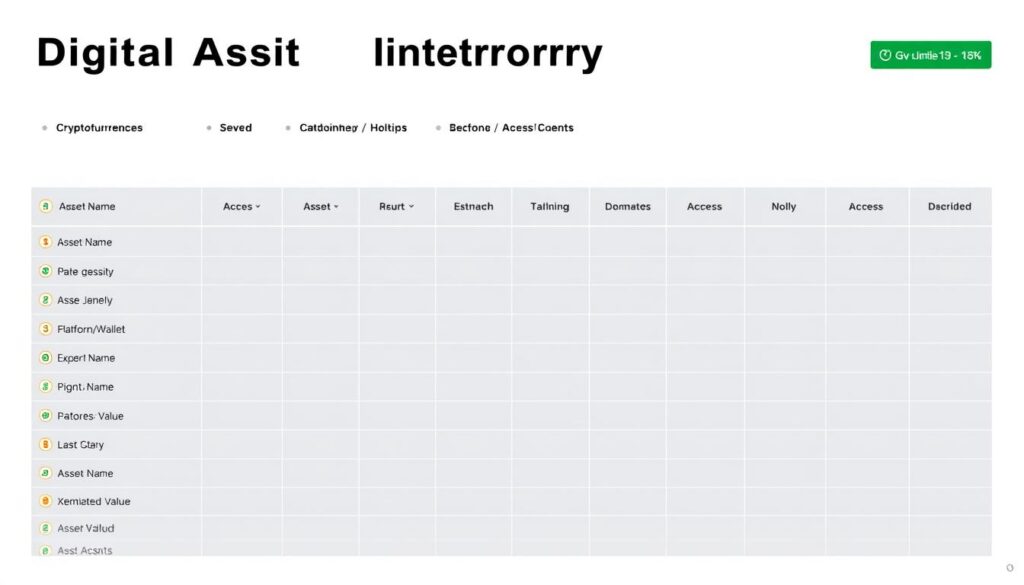
Essential Components of Your Crypto Inventory
| Asset Information | What to Document | What to Exclude |
| Cryptocurrency Type | Bitcoin, Ethereum, etc. | Private keys or seed phrases |
| Storage Location | Exchange name, hardware wallet type | Passwords or PINs |
| Wallet Addresses | Public addresses only | Recovery methods |
| Approximate Value | Estimated holdings | Exact amounts |
| Access Instructions | Location of access guide | Actual access details |
Pro Tip: Update your inventory quarterly, especially after significant purchases, sales, or wallet changes. Set calendar reminders to ensure this becomes a regular practice.
Sample Inventory Entry
“Bitcoin (BTC): Approximately 0.75 BTC stored on Ledger Nano X hardware wallet. Device located in home safe. Access instructions in sealed envelope with attorney. Last updated: [Date].”
Step 2: Secure Private Keys While Ensuring Heir Access
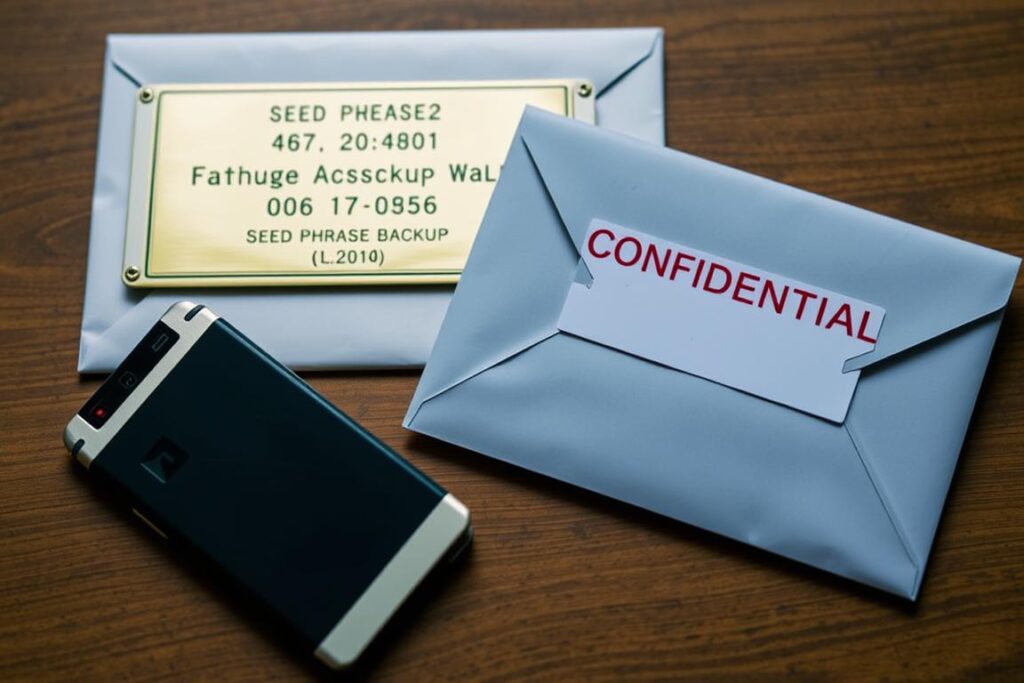
The central challenge in cryptocurrency inheritance planning is balancing security with accessibility. Your private keys and recovery phrases must remain secure during your lifetime but accessible to heirs when needed.
Recommended Key Security Methods
Hardware Wallets
Devices like Ledger or Trezor provide offline storage for private keys. Store the device in a secure location (like a safe) and document its location in your inheritance plan.
Metal Backup Plates
Engrave your seed phrase on fireproof, waterproof metal plates. Products like Cryptosteel or Billfodl provide durable storage for recovery phrases.
Multisignature Wallets
Configure wallets requiring multiple keys to access funds. This allows you to distribute keys among trusted individuals or secure locations.
Split Seed Phrases
Divide your recovery phrase into multiple parts using Shamir’s Secret Sharing, requiring a minimum number of parts to reconstruct the full phrase.
Custodial Services
Services like Casa or Unchained Capital offer inheritance protocols with institutional-grade security and designated beneficiary access.
Smart Contract Inheritance
For Ethereum and compatible assets, smart contracts can automate inheritance based on predefined conditions or inactivity periods.
Critical Warning: Never store private keys or seed phrases in digital documents, cloud storage, or password managers unless using specialized encryption. These methods are vulnerable to hacking and could compromise your entire crypto portfolio.
Example Access Instructions
“I, [Your Name], grant my executor access to my Ledger Nano X hardware wallet stored in the home safe (combination in sealed envelope with attorney). The 24-word recovery phrase is stored on a metal plate in the safety deposit box at [Bank Name], box #123. Access requires both the device and recovery phrase to transfer assets.”
Step 3: Address Legal Considerations for Digital Assets
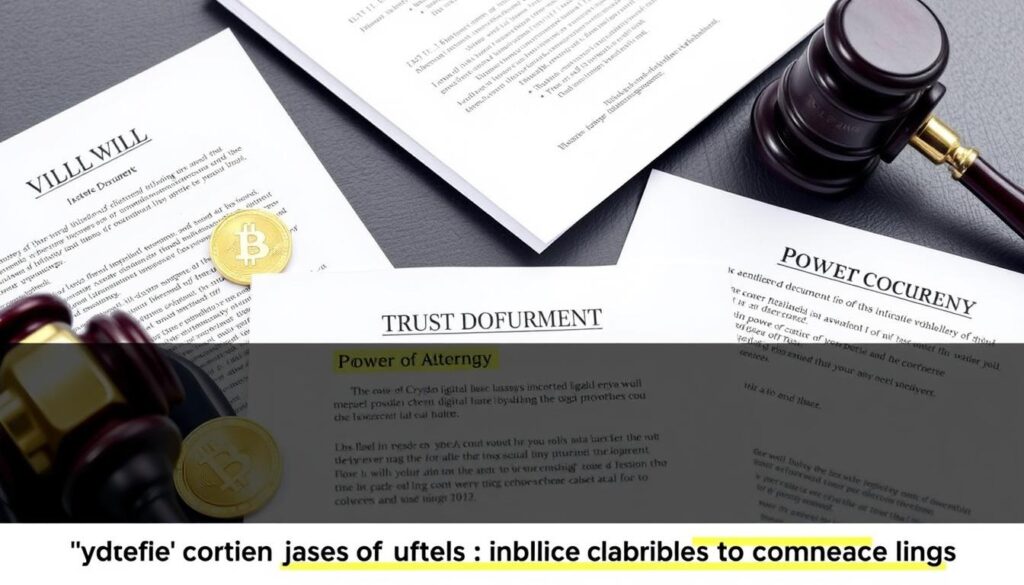
Cryptocurrency exists in a complex legal landscape that varies by jurisdiction. Proper documentation is essential to ensure your digital assets are legally transferred according to your wishes.
Will vs. Trust for Cryptocurrency
- Simpler to create
- Lower initial cost
- Legally recognized in all jurisdictions
- Can name specific digital asset executor
Will
- Avoids probate (public process)
- Provides privacy for holdings
- Can include detailed access instructions
- Can manage assets if you’re incapacitated
- Better for complex crypto portfolios
Trust
Essential Legal Documents
- Will with Digital Asset Clause: Explicitly mentions cryptocurrency and designates who inherits these assets
- Digital Asset Memorandum: Detailed but separate document referenced in your will that provides specific instructions
- Durable Power of Attorney: Includes specific language about managing digital assets if you become incapacitated
- Letter of Intent: Non-binding document explaining your wishes regarding cryptocurrency management
Legal Tip: The Revised Uniform Fiduciary Access to Digital Assets Act (RUFADAA) has been adopted in most U.S. states and provides a legal framework for fiduciary access to digital assets. Ensure your documents comply with your state’s version of this law.
Sample Will Clause for Cryptocurrency
“I bequeath all my cryptocurrency and digital assets to [Beneficiary Name]. I authorize my Digital Asset Executor to access, manage, and distribute these assets according to the instructions in my confidential Digital Asset Memorandum, dated [Date], which is stored [Location].”
Get Professional Legal Guidance
Cryptocurrency inheritance laws vary by location and evolve rapidly. Consult with an attorney experienced in digital asset estate planning.
Step 4: Appoint a Crypto-Literate Executor

Traditional executors may lack the technical knowledge to handle cryptocurrency assets. Appointing someone with specific crypto expertise—or ensuring your executor has proper guidance—is crucial for successful asset transfer.
Executor Qualifications Checklist
- Basic understanding of blockchain technology and cryptocurrency
- Experience managing hardware wallets and private keys
- Awareness of security best practices
- Trustworthiness and discretion
- Willingness to follow detailed technical instructions
- Ability to work with professional advisors when needed
Options for Crypto-Competent Administration
Dedicated Digital Executor
Appoint a separate executor specifically for digital assets, working alongside your primary executor.
Professional Fiduciary
Hire a professional executor service with cryptocurrency expertise to manage the technical aspects.
Executor’s Consultant
Name a technical advisor in your will who can assist your executor with cryptocurrency matters.
Training Resource: Create a “Crypto Training Guide” for your executor with step-by-step instructions for accessing and transferring your specific assets. Update this guide whenever you change wallets or security procedures.
Step 5: Consider Automated Inheritance Solutions
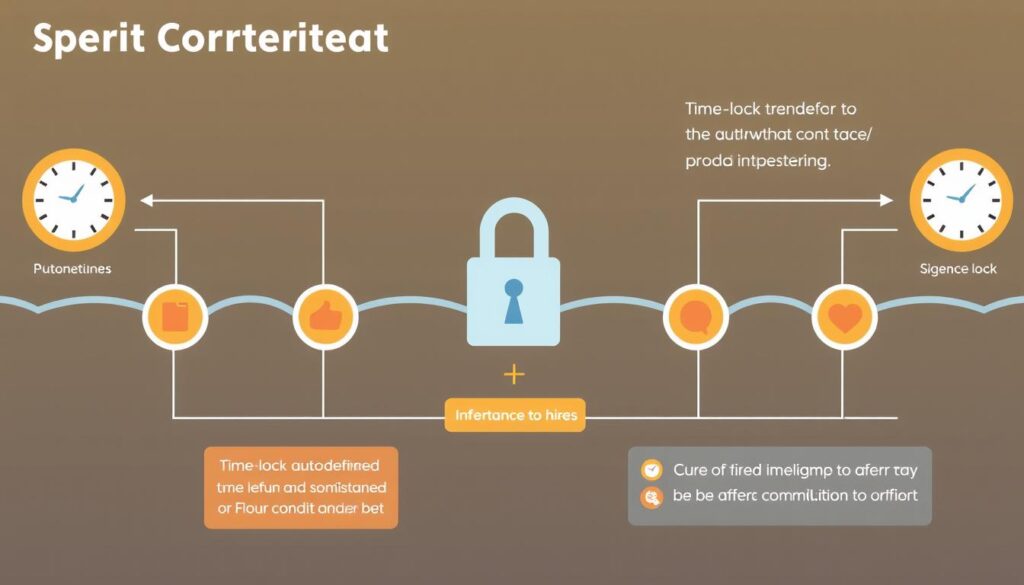
Technology offers innovative solutions for cryptocurrency inheritance that can complement traditional legal planning. These automated systems can provide additional security and certainty.
Dead Man’s Switch Protocols
These systems require periodic check-ins to confirm you’re still actively managing your assets. If you fail to respond for a predetermined period, the system initiates a transfer process to your designated heirs.
Smart Contract Inheritance
For Ethereum and compatible cryptocurrencies, smart contracts can be programmed with inheritance logic that executes automatically based on predefined conditions.
| Solution Type | Recommended Services | Best For |
| Dead Man’s Switch | Safe Haven, TrustVerse | Holders wanting automated backup with regular check-ins |
| Smart Contract Inheritance | Inheritance Protocol, Sarcophagus | Ethereum and ERC-20 token holders |
| Multisig Inheritance | Casa Covenant, Unchained Capital | Bitcoin holders seeking institutional-grade security |
| Custodial Inheritance | Coinbase Custody, Gemini | Those preferring institutional management |
Important: Automated solutions should supplement, not replace, proper legal documentation. Always maintain traditional estate planning documents alongside technological solutions.
Step 6: Understand Tax Implications for Heirs
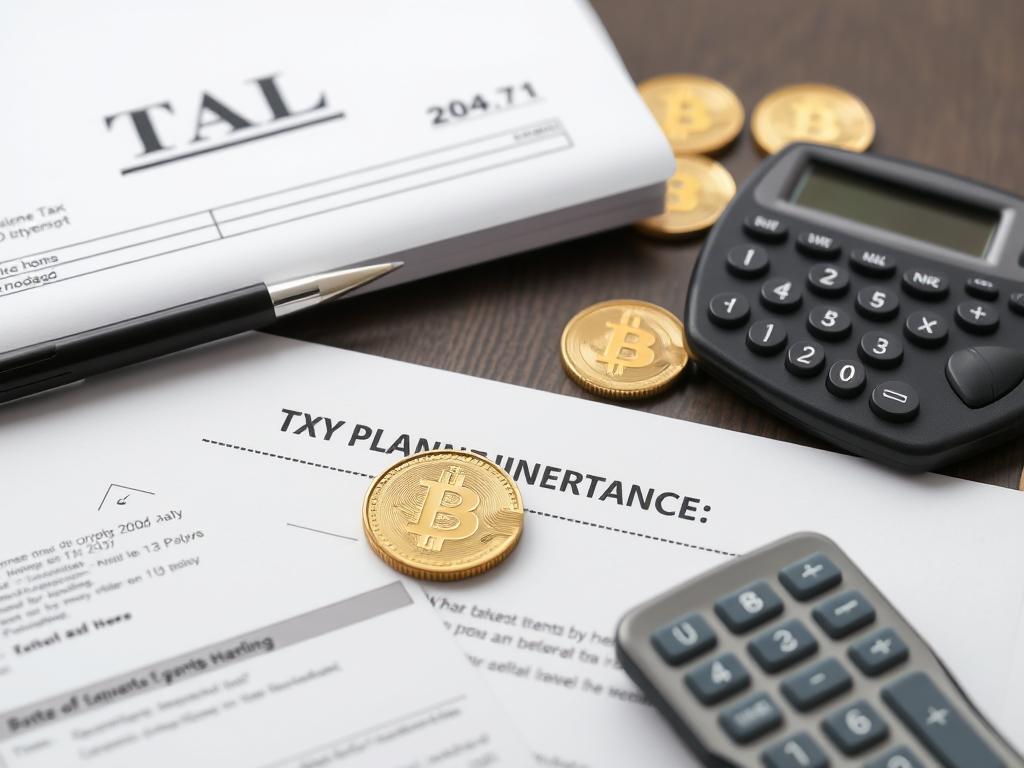
Cryptocurrency inheritance carries significant tax implications that vary by jurisdiction. Proper planning can minimize tax burdens on your heirs and prevent compliance issues.
Key Tax Considerations
- Basis Step-Up: In many jurisdictions, inherited cryptocurrency receives a “stepped-up basis” to its fair market value at the time of death, potentially eliminating capital gains tax on appreciation during your lifetime
- Estate Tax Thresholds: Large cryptocurrency holdings may trigger estate taxes if they push your estate over exemption thresholds
- Gift Tax Planning: Strategic gifting during your lifetime can reduce estate size and provide tax advantages
- Valuation Challenges: Cryptocurrency’s volatility creates challenges in establishing fair market value for tax purposes
“Cryptocurrency is treated as property for tax purposes, not as currency. This classification affects everything from basis calculation to how transfers are taxed.”
Documentation for Tax Compliance
Maintain detailed records to help your heirs meet tax obligations:
- Acquisition dates and costs for all holdings
- Records of any improvements or additional investments
- Transaction history showing any splits, airdrops, or forks
- Documentation of any previous gifts or transfers
Tax Tip: Consider consulting with a tax professional experienced in cryptocurrency to develop a tax-efficient inheritance strategy specific to your holdings and jurisdiction.
Crypto Estate Preparedness Checklist
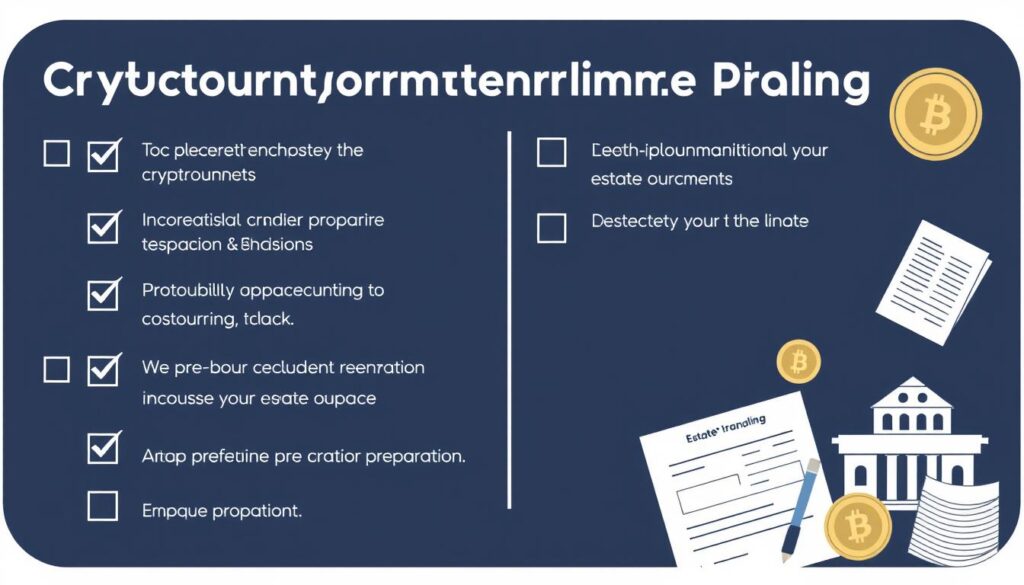
Use this checklist to ensure you’ve covered all essential aspects of your cryptocurrency inheritance plan:
- ✅ Created comprehensive inventory of all digital assets
- ✅ Implemented secure storage for private keys and seed phrases
- ✅ Documented access instructions in a secure location
- ✅ Updated will or trust with specific cryptocurrency provisions
- ✅ Appointed crypto-literate executor or advisor
- ✅ Created step-by-step access guide for heirs
- ✅ Considered automated inheritance solutions as backup
- ✅ Documented acquisition history for tax purposes
- ✅ Consulted with legal professional about jurisdiction-specific requirements
- ✅ Set calendar reminder to review plan quarterly
- ✅ Tested the inheritance process with a small amount
- ✅ Informed key people about the existence (not details) of your plan
Download Your Complete Checklist
Get our detailed Crypto Estate Preparedness Checklist with additional guidance and space for your personal notes.
Common Cryptocurrency Inheritance Mistakes to Avoid
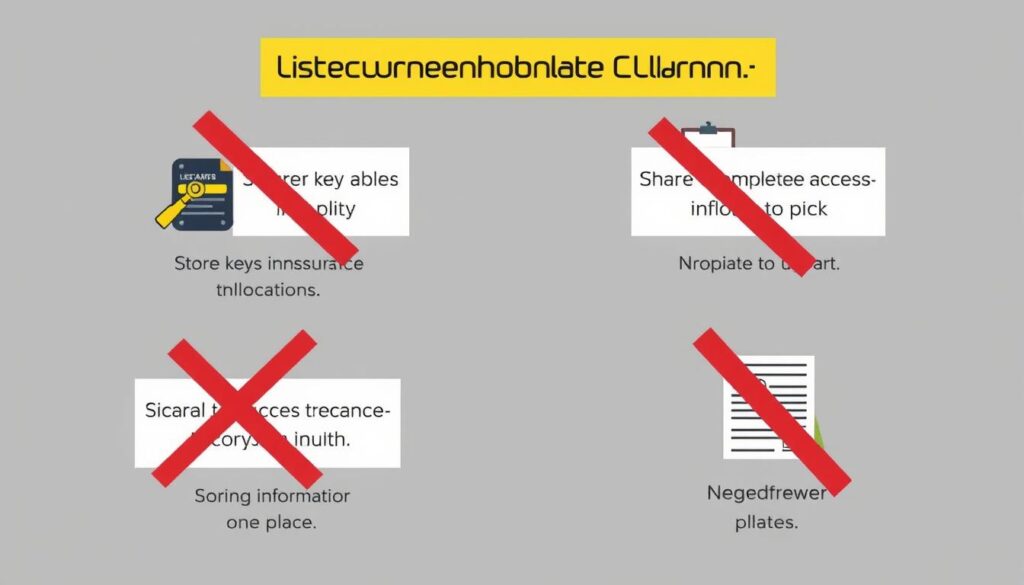
Storing Keys in Unsecured Locations
Never store private keys or seed phrases in emails, cloud documents, or unencrypted files. These are vulnerable to hacking and could compromise your entire portfolio.
Sharing Complete Access Information
Avoid putting all access information in one place. Distribute components of your access system to prevent any single point of failure or vulnerability.
Relying Solely on Exchanges
Exchange accounts may be frozen upon death notification. Don’t assume exchanges will cooperate with heirs, even with proper documentation.
Neglecting Regular Updates
Cryptocurrency holdings change over time. Failing to update your inventory and access instructions regularly can render your plan ineffective.
Overly Complex Systems
Creating inheritance systems so complex that even technically-savvy heirs can’t navigate them defeats the purpose of planning.
Ignoring Jurisdictional Differences
Cryptocurrency inheritance laws vary globally. Ensure your plan complies with the specific legal requirements of your jurisdiction.
Recommended Tools for Cryptocurrency Estate Planning
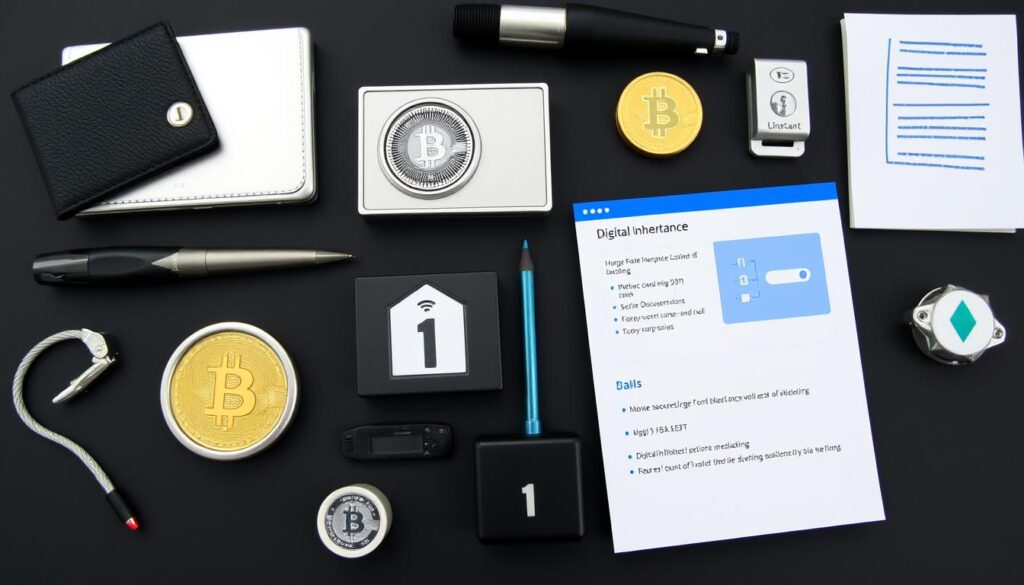
Secure Storage Solutions
Hardware Wallets
Ledger Nano X – Secure offline storage with inheritance planning features
Trezor Model T – User-friendly interface with Shamir backup support
Seed Phrase Storage
Cryptosteel Capsule – Fireproof, waterproof metal storage
Billfodl – Stainless steel backup resistant to environmental damage
Secure Documentation
LastPass – Password manager with emergency access feature
1Password – Secure document storage with designated recovery contacts
Inheritance Services
Custody Solutions
Casa Covenant – Bitcoin inheritance service with multisignature security
Unchained Capital – Collaborative custody with inheritance planning
Legal Services
Trust & Will – Online estate planning with cryptocurrency provisions
Everplans – Digital legacy planning platform
Smart Contract Solutions
Safe Haven – Blockchain inheritance platform
Inheritance Protocol – Automated Ethereum inheritance
Tool Selection Tip: Choose tools based on your technical comfort level, the types of cryptocurrency you hold, and your overall estate size. For substantial holdings, consider using multiple complementary solutions.
Securing Your Cryptocurrency Legacy

Cryptocurrency inheritance planning combines traditional estate planning principles with modern technological solutions. By taking proactive steps today, you ensure your digital assets remain accessible to your loved ones while maintaining the security that makes cryptocurrency valuable.
Remember that cryptocurrency inheritance planning isn’t a one-time task. As your holdings change, as technology evolves, and as regulations develop, your plan should adapt accordingly. Set a quarterly reminder to review and update your plan to ensure it remains effective.
“The true value of cryptocurrency isn’t just in its current worth, but in its ability to be securely transferred to the next generation.”
Don’t wait until it’s too late. Start implementing your cryptocurrency inheritance plan today to protect your digital legacy and provide peace of mind for yourself and your loved ones.
Take the First Step Today
Download our comprehensive Crypto Estate Planning Kit and schedule a consultation with a cryptocurrency estate planning specialist.
Frequently Asked Questions
What happens to my cryptocurrency if I die without an inheritance plan?
Without proper planning, your cryptocurrency could become permanently inaccessible. Unlike traditional bank accounts, there is no central authority that can help heirs recover access to cryptocurrency wallets without private keys or seed phrases. The assets would effectively be lost forever, regardless of their value.
Is it safe to include private keys in my will?
No, including private keys or seed phrases directly in your will is not recommended. Wills become public documents during probate, potentially exposing your cryptocurrency to theft. Instead, reference the existence of digital assets in your will and provide access instructions in a separate, secure document that’s referenced in the will but not filed with it.
How often should I update my cryptocurrency inheritance plan?
You should review and update your plan quarterly at minimum, and immediately after any significant changes to your holdings, wallet structures, or security procedures. Also update after major life events like marriage, divorce, or the birth of children who may become beneficiaries.
Can I use a smart contract to automatically transfer my cryptocurrency when I die?
Yes, for certain cryptocurrencies like Ethereum, smart contracts can be programmed to transfer assets based on specific triggers. However, these should complement rather than replace traditional legal documentation. Smart contracts may not account for all legal requirements in your jurisdiction and could face technical limitations.
What’s the best way to ensure my heirs understand how to access my cryptocurrency?
Create detailed, step-by-step instructions written for someone with minimal technical knowledge. Consider recording video tutorials demonstrating the process. Identify a tech-savvy individual who can assist your heirs, and consider arranging a “practice run” with a small amount of cryptocurrency to ensure your instructions work as intended.


No comments yet